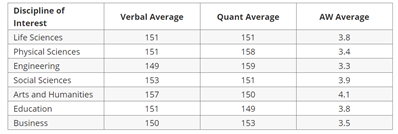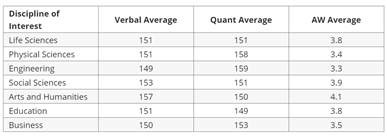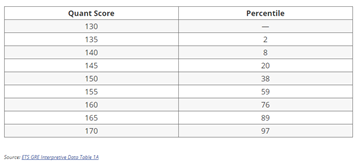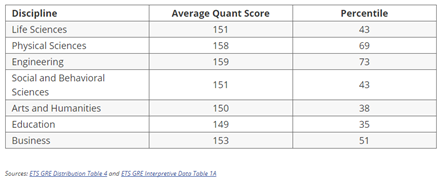-
Posts
10 -
Joined
-
Last visited
Profile Information
-
Gender
Male
-
Location
PrepScholar Boston
-
Interests
Math Education, GRE quant prep
-
Application Season
Not Applicable
-
Program
Math Education
Recent Profile Visitors
The recent visitors block is disabled and is not being shown to other users.
CoreyM's Achievements

Decaf (2/10)
0
Reputation
-
 fortsibut reacted to a post in a topic:
GRE Concerns
fortsibut reacted to a post in a topic:
GRE Concerns
-
CoreyM started following GRE/admissions question , Which GRE scores should I send? , Which GRE score should I send? and 1 other
-
Hey Karasu56. I was in a similar academic situation as you, as I was applying to Chemical Engineering PhD programs at MIT and CalTech before choosing to go to MIT. Here are GRE section averages by program type, provided by ETS. Not too surprisingly, Engineering applicants tend to have higher quant scores than they do verbal scores. And for good reason to, as your first-year grad courses will heavily involve upper level math (yes, that DiffEQ class you took in undergrad will finally be put to use!). So for that reason, I'd suggest sending in the second score since it has a higher quant score. Finally, I'd suggest trying to improve your GRE scores a bit, particularly if you're applying to a competitive program. Your quant score is just slightly below average, and bumping it up 5 points or so would put you on the other side of the average. To study, I'd suggest that you break the GRE into “digestible skills” and identify your weakest skills. Then specifically focus on those skills where you're weakest. Remember to spend more time learning and reviewing your mistakes and less time mindlessly practicing problems. If you target practice and improve your performance skill by skill, before you know it you’ll be seeing a clear increase in your GRE score and soon enough, you’ll be hitting and exceeding your target GRE score. Best of luck!
-
After being accepted to MIT, I was able to talk to a professor on one of the committees about the application and acceptance process. Though they were a bit cryptic in responding to probing questions, I could definitely gather that they viewed the GRE scores as a part of a larger formula. From that, I deduced that it would be the actual score they use. They wouldn't introduce a new variable, such as "GRE score increase" or "GRE point increase per month". So basically, they keep it simple to keep their lives simple. Raw scores vary because: 1) you're human and 2) the tests vary. But definitely send in that first score, as it is more impressive! Good luck to you!
-
Hey Lemondrizzle. Definitely some AMAZING quant scores there. For Life Sciences programs, ETS reports that the average quant score was 151, the average verbal score 151, and writing was 3.8. From a statistics standpoint, your first score has a higher overall percentile. While your verbal is 2 points lower compared to your second test, your quant score is 4 points higher and, quite impressively, your writing score is 1.5 points higher! Truth is, most grad programs will involve a LOT more writing that you might expect, so I would definitely showcase your good writing skills by sending your first test.
-
Hey Cwidis, Here's a link to an ETS website where they have sample Issue and Argument essays, along with scores and critiques for them. I've found these very helpful in estimating essay scores. https://www.ets.org/gre/revised_general/prepare/analytical_writing/argument/sample_responses https://www.ets.org/gre/revised_general/prepare/analytical_writing/issue/sample_responses Some brief pointers I'd suggest are, for Argument essays, always focus on and analyze the logic. This includes finding flaws in the logic. Try to avoid just stating that you agree or disagree with statements. Answers like that tend to be vague and invite low scores from the graders. Also, only focus on the major points. If you get caught up in small details, your essay won't flow and won't be convincing. Finally, only use information found in the argument. Don't assume what's not stated. Also, try to find unstated assumptions. Following these pieces of advice should help you in crafting a well-focused, high-scoring essay. It's about writing smart with a purpose, not filling up the prompt with a slew of words. Corey
-
Don't give up hope astronaut. With just a bit of extra practice you can find yourself soaring to the grad school of your dreams. For the quant scores that you listed, a company I've worked for found that to get a 5-point improvement you'll need to spend approximately 38.6 hours of focused study time. So rounding that, you're looking at about 40 hours of focused study time. And by focused study time, I mean: 1) break up the GRE into "digestible" skills, 2) identify your weakest skills, and 3) focus on questions in your weakest skills. Many students do this on their own, by making an Excel spreadsheet to see what kinds of questions they're missing on practice exams. There are also some products out there focused on identifying and targeting your weakest skills. You'll also want to make sure that you're studying smart. Focus on quality, not quantity. Learn what you need to learn, and do not mindlessly practice for hours on end. Take every single question seriously and review your answers carefully to make sure you learn to never make the same mistake twice. If you target practice and improve your performance skill by skill, before you know it you’ll be seeing a clear increase in your GRE score and soon enough, you’ll be hitting and exceeding your target GRE score. Don't let a couple of points on the quant section stand between you and your dreams.
-
Hey Lele93. It looks like your GRE score puts you right in the middle of the pack. Here's a table I found from ETS that gives GRE scores and the corresponding percentiles: So with a quant score of 154, you're somewhere around the 55th percentile. The good news about being in the middle of the pack with your score is that with just a small improvement in your score, you'll leapfrog ahead of a LOT of people. For example, just a 6 point increase and you'll jump up 21 percentile points to be at the 76th percentile! Another thing to consider is the program you're applying for, as some programs have higher quant averages than others. Here's a table I found from ETS that lists the average GRE quant score vs. program type. So if you're going into Engineering or Physical Sciences, a low GRE quant score sticks out a bit more than if you're going into Education. There's lots of great info out there about what scores you'll need for different situations. If you're interested, here's a blog that goes into a bit more depth about this. Hope this helps! https://www.prepscholar.com/gre/blog/good-gre-quantitative-score/
-
 CoreyM reacted to a post in a topic:
GRE/admissions question
CoreyM reacted to a post in a topic:
GRE/admissions question
-
Hey Becca. Yeah, I definitely see what you're saying here. So many schools place a big emphasis on the GRE, and I bet a lot of the administrators don't even know what kind of questions are on the test! But as long as they're using it to grade us when we apply to their programs, might as well figure out how to crack a good score on it. Here's a blog with 38 commonly used math equations on the GRE quant section. By learning these quick formulas, you can bump your score up a couple of points, get into the Psych program of your dreams, and be rid of the test once and for all. https://www.prepscholar.com/gre/blog/gre-math-formulas-cheat-sheet/
-
 Sandmaster reacted to a post in a topic:
Took GRE twice - quant is till low. should I apply?
Sandmaster reacted to a post in a topic:
Took GRE twice - quant is till low. should I apply?
-

Took GRE twice - quant is till low. should I apply?
CoreyM replied to so_stressy's topic in GRE/GMAT/etc
Hey so_stressy. It's never too late to improve your GRE quant score. Since you're likely looking to make improvements to your GRE quant score in a short period of time, I'd recommend a focused approach to studying. To do well on the GRE Quantitative section, you don’t need to be a math genius — but you do need to have access to the best resources for GRE math prep! Here's a link to a guide going over the pros and cons of 18 different study resources for the GRE. Hope this helps you! https://www.prepscholar.com/gre/blog/best-gre-math-prep/





